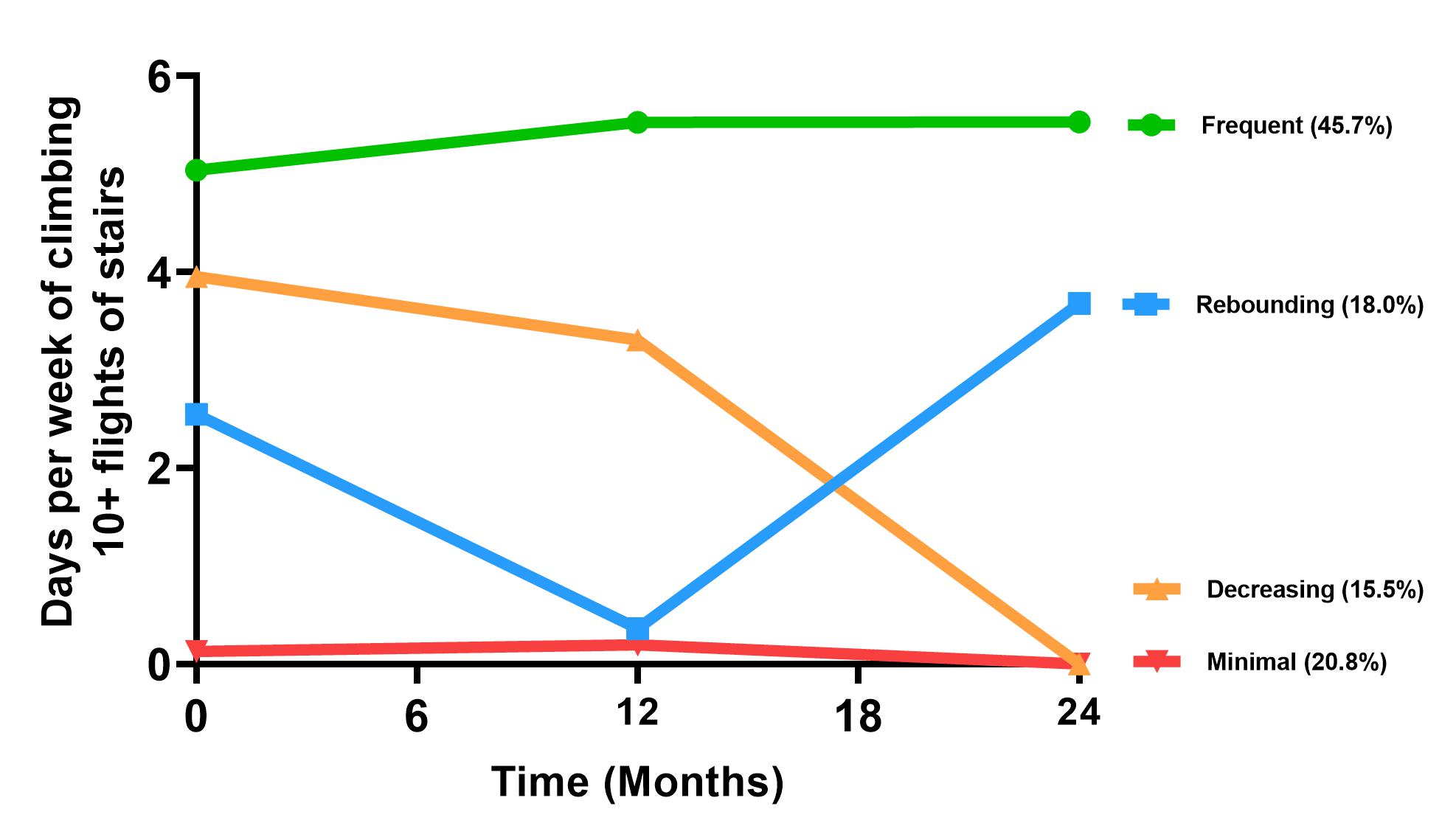Session Information
Date: Tuesday, November 9, 2021
Title: Abstracts: Orthopedics, Low Back Pain, & Rehabilitation (1901–1904)
Session Type: Abstract Session
Session Time: 11:00AM-11:15AM
Background/Purpose: Knee osteoarthritis (OA) is a common cause of functional limitation in older adults, and difficulty with climbing stairs is one of the first limitations to be reported. As such, reducing the frequency of stair climbing may serve as an early warning sign of future poor health outcomes. Little is known, however, about how stair use may fluctuate over time and if such fluctuations are related to future health – particularly slow gait speed given its strong relationship with poor health outcomes (e.g., hospitalization, early mortality). Therefore, the purpose of this study was to identify and describe trajectories of stair climbing frequency over 2 years in adults with or at high risk for knee OA and to determine the association between said trajectories and incident slow gait speed at 1- and 2-years.
Methods: Using data from the Osteoarthritis Initiative (OAI), stair climbing frequency was assessed by asking “How often do you climb up a total of 10 or more flights of stairs during a typical week, in the past 30 days?”. Choices included None, 1-2 days per week, 2-3 days per week, 4-5 days per week, & nearly every day or every day. Responses were collected at baseline and at the 1- and 2-year clinic visits. Our study outcome was slow gait speed, defined as walking < 1.22 m/s over 20 meters, which is the pace needed for a timed crosswalk. We measured incident slow gait speed at the 3-year and 4-year clinic visits (i.e., 1- and 2-years of follow-up) in separate analyses. Our analytic dataset included those without slow gait speed at the 2-year clinic visit. Trajectories of stair climbing frequency over 2 years were identified using group-based modeling. Posterior probabilities of individual trajectories into the larger groups were used to describe model fit. Subject characteristics for trajectory groups were described using descriptive statistics. To determine the association of trajectory group membership with incident slow gait speed, we used binomial regression models to calculate relative risks (RR) and 95% confidence intervals (95% CI), adjusted for potential confounders at the 2-year clinic visit, i.e., our analytic baseline.
Results: Four distinct trajectory groups were generated (Fig 1): Frequent (45.7%), Rebounding (18.0%), Decreasing (15.5%), Minimal (20.8%), and descriptive characteristics are listed in Table 1. Compared to the Frequent stair climbing group, risk for incident slow gait speed was 45%, 68%, and 59% greater for the Rebounding, Decreasing, and Minimal Frequency groups, respectively, after 1 year (Table 2). We found similar findings for incident slow gait speed after 2 years (Table 2).
Conclusion: Compared to those who engaged in frequent stair climbing (at least 5 days per week), adults with knee OA who either seldom used the stairs, decreased their stair climbing over 2 years, or had a fluctuating pattern of stair climbing all were at greater risk for developing a slow gait speed by both subsequent years of follow-up. Given that stair climbing is a high-demand functional task, the stark increased risk in worsening function (via slow gait speed) over a short period of time is of concern. Adults with knee OA who report decreased stair climbing are prime targets for early intervention to prevent future loss of general function.
 Figure 1: Short-term trajectories of stair climbing frequency over 2 years
Figure 1: Short-term trajectories of stair climbing frequency over 2 years
 Table 1: Descriptive characteristics of the overall sample and each stair climbing frequency trajectory group at analytic baseline
Table 1: Descriptive characteristics of the overall sample and each stair climbing frequency trajectory group at analytic baseline
 Table 2: RRs & 95% CIs for the association between stair climbing frequency trajectories and incident slow gait speed at 1 and 2 years
Table 2: RRs & 95% CIs for the association between stair climbing frequency trajectories and incident slow gait speed at 1 and 2 years
To cite this abstract in AMA style:
Jakiela J, Zhang Y, Voinier D, Bye T, Copson J, White D. Does Limited Stair Climbing Lead to Poor Future Health? The Relationship Between Short-term Trajectories of Stair Climbing Frequency and Incident Slow Gait Speed over 1 and 2 Years in Adults with Knee Osteoarthritis [abstract]. Arthritis Rheumatol. 2021; 73 (suppl 9). https://acrabstracts.org/abstract/does-limited-stair-climbing-lead-to-poor-future-health-the-relationship-between-short-term-trajectories-of-stair-climbing-frequency-and-incident-slow-gait-speed-over-1-and-2-years-in-adults-with-knee/. Accessed .« Back to ACR Convergence 2021
ACR Meeting Abstracts - https://acrabstracts.org/abstract/does-limited-stair-climbing-lead-to-poor-future-health-the-relationship-between-short-term-trajectories-of-stair-climbing-frequency-and-incident-slow-gait-speed-over-1-and-2-years-in-adults-with-knee/
